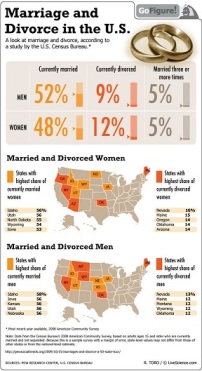
Divorce and death are two of the most common events that take place in the average person’s life. Unfortunately divorce and death often involve some pretty potent cocktails of emotion, leading to the types of fights that leave relationships and families torn asunder. What’s more, the legal proceedings involved in a divorce are extremely expensive, sometimes too expensive for married couples that desire a divorce. Lucky for us a group of researchers have created what they believe to be an easy and viable solution to divorce and inheritance disputes.
Related Article: Biggest Wastes of Money (Part 2): Bottled Water, Weddings, Jewelry, Paper Towels
In a paper published in Notices of the American Mathematical Society, researchers Steven Brams from New York University, Wilfrid Laurier University’s D. Marc Kilgour, and the University of Graz’s Christian Klamler outline a pair of simple algorithmic functions that divvy up property and wealth in a completely fair and envy-free way.
The distribution of property is an age old issue, possibly one of the original conflicts early humans faced hundreds of thousands of years ago. As the authors note in the paper,
The problem of fairly dividing a divisible good, such as cake or land, between two people probably goes back to the dawn of civilization.

As society has evolved, more and more of our possessions have become indivisible, especially in the case of non-allocated marital property in a divorce. The researchers state that this added difficulty with regards to indivisible property is no challenge for their algorithms.
Unlike more demanding fair-division algorithms, which ask players to give more detailed information or make more difficult comparisons, our algorithms are easy to apply and, therefore, eminently practicable.
The algorithms take into account how each party ranks a list of their self-identified priorities from best to worst. In this way the algorithms are able to optimize fairness. The first algorithm requires that players take turns attributing a rank to items, starting with their most preferred item and descending to their least preferred item. The second algorithm asks that each party submit the complete preference ranking to an unbiased source, or a computer.
Related Article: In 1610 God Was a Binary, Fractal, Self-Replicating Algorithm
The algorithms are envy-free because they do not compare items directly, but rather the preference each party has for an item relative to preferences for other items as well as the opposite party’s preferences. This should be an easy process, but divorce is never easy, is it? If both parties desire an item at the same point in the algorithm, meaning that the relative preference each party has for the item is equivalent, a problem arises. Let’s take an example of party A and B ranking four items from left to right (most preferred to least preferred):
A: 1 2 3 4
B: 2 3 4 1Now, if we give A item 1 and B item 2 (their most preferred), the next unallocated item on both their lists is item 3. Who should get it? The algorithm gives it to A and gives item 4 to B, which is an envy-free allocation because each player prefers its items to the other player’s:
A prefers item 1 to 2 and item 3 to 4
B prefers item 2 to 3 and item 4 to 1Not only does each party prefer its pair of items to the other’s, but there is no alternative allocation that both parties would prefer, which makes it efficient.

An ideal allocation isn’t always possible using the algorithm, but to be fair, an ideal allocation is practically never possible during a divorce, so this is a major improvement regardless. If worst comes to worst, the algorithm can place items that both A and B have a high preference for into a contested pile to be argued over at a later time. This at least makes the pile of non-allocated items smaller, and attorney fees less expensive for both parties.
Related Article: Money, Designed to Fail: In The Federal Reserve’s Grip
There are nearly 1 million divorces occurring in the United States each year. Some countries have divorce to marriage ratios as high as 71%. As for inheritance disputes, everyone dies, so major familial disputes are inevitably ubiquitous around the world. Just think of all the time, money, stress, and relationships these simple algorithms will save.
Sources:
http://www.ams.org/notices/201402/rnoti-p130.pdf
http://www.cdc.gov/nchs/fastats/divorce.htm
http://www.npr.org/templates/transcript/transcript.php?storyId=144021297
http://unstats.un.org/unsd/demographic/products/dyb/dyb2011/Table25.pdf



